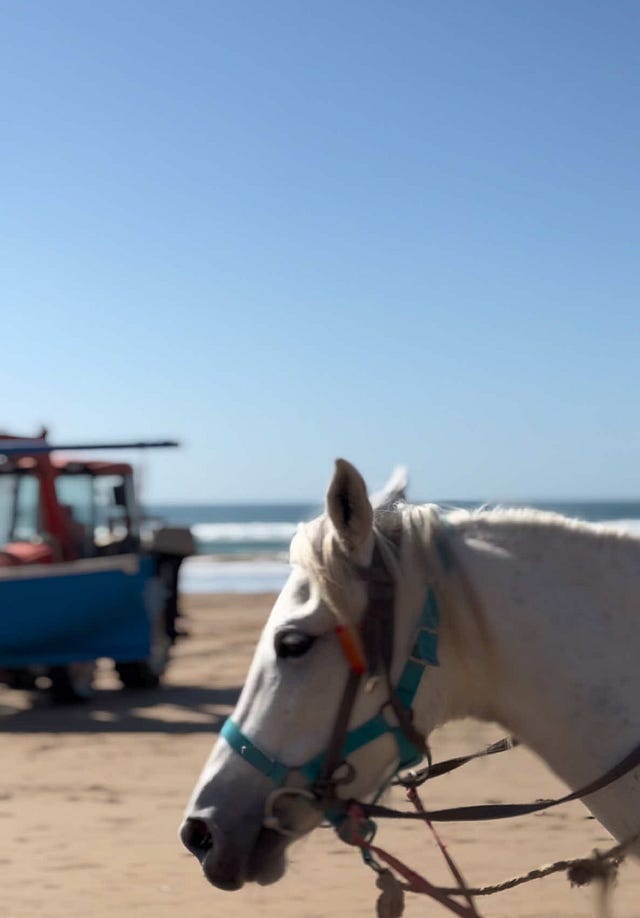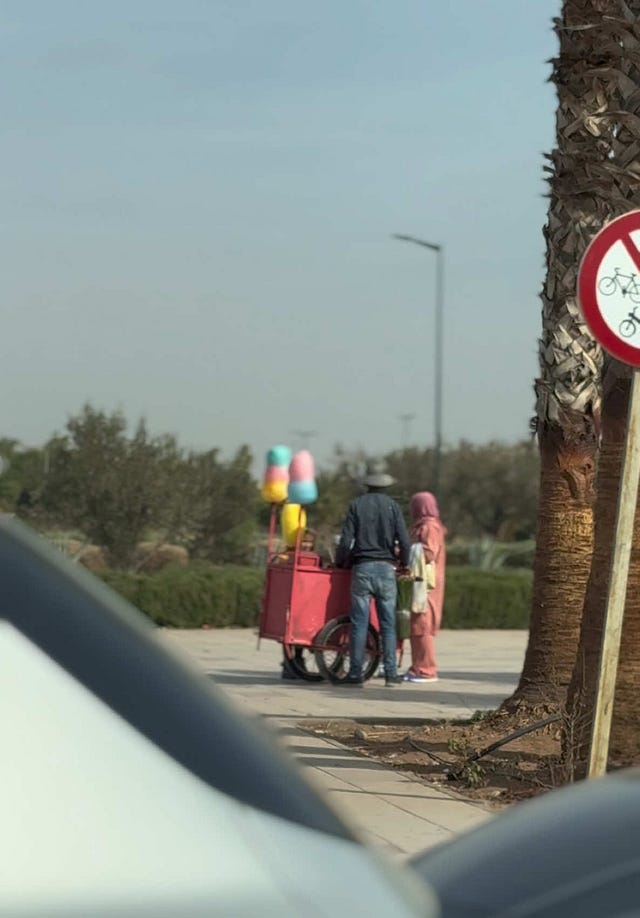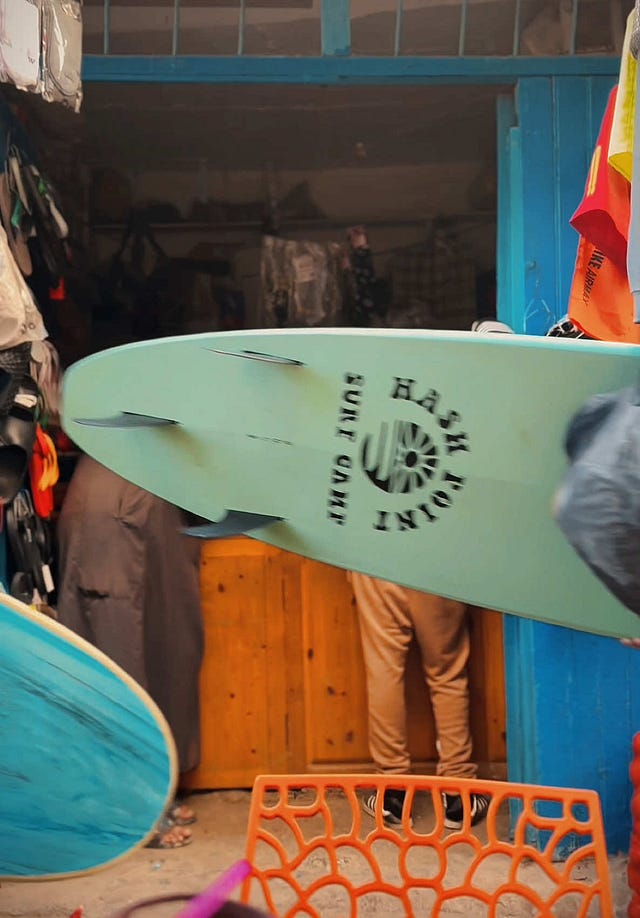Hey friend,
This isn’t a dreamy travel diary.
This is a story about a few necessary lessons.
A trip that reminded me:
If you want to feel safe and have fun, nervous system regulation comes first.
Not a suitcase. Not an itinerary. Your presence.
Let me tell you what happened.
The trip was rushed from the start.
We booked last minute flights from Athens to Marrakech to visit my partner’s family.
He reserved the first few nights while on the bus from Marrakech to Agadir.
No pause. No grounding. No breathing space.
It felt off from the first moment—and I didn’t listen.
We ended up moving hotels every few days.
Everything was either full or overpriced.
Some places smelled like sewage. Others were loud, cold, or had no hot water.
My mind said, “Adapt.”
Like I perfectly did before. I spent two years in Morocco before as a yoga teacher.
I lived through the heat, the cold showers, the unexpected power outages, and the occasional “where’s my bus?” moments.
I adapted. I rolled with it. I found joy in the chaos, learned to dance with unpredictability, and built beautiful, meaningful relationships.
But this time? It felt different.
I tried to keep up the same mindset: adapt, adapt, adapt.
But what I hadn’t realized was how much I’d changed since then.
The carefree traveler who thrived in uncertainty wasn’t the same person anymore.
I’d grown more attuned to my needs, my boundaries, and the standards I held for myself—and that was okay.
Mindfulness would’ve asked me: What feels different now?
It wasn’t that Morocco had changed, though it certainly had.
It was that I had. I was no longer in the same space mentally, emotionally, or physically.
I learned that adapting doesn’t mean settling.
It doesn’t mean compromising your sense of safety or peace to fit into a situation.
Adapting can also mean choosing your version of comfort, even if it doesn’t align with what others expect.
But my mind didn’t want to let go of the past.
I thought I should embrace everything the way I used to.
And I nearly paid the price for not listening to the deeper parts of myself.
In hindsight, mindfulness would’ve whispered: You can adapt while holding onto your values.
But my body was tense.
I ignored the discomfort because I didn’t want to be “too picky.”
Mindfulness would’ve asked me:
What are you noticing right now in your body?
What feels off, even if you can’t explain it yet?
I didn’t ask those questions soon enough.
—
Taghazout wasn’t the place we remembered.
We had met there seven years ago.
It used to be quiet, simple, slow.
Now it’s crowded. Expensive. Cafés packed. Less soul.
Still, I kept trying to recreate the old feeling.
But clinging to nostalgia isn’t presence. It’s resistance.
Things change. Places evolve.
Trying to force joy where it no longer lives only drains your energy.
Mindfulness reminds us:
Let go of what was. Stay with what is.
—

 Tiktok failed to load.
Tiktok failed to load.Enable 3rd party cookies or use another browser
"Game changer for content creators" 👉 Join the 1,000+ creators using Revid AI and start crafting viral videos
Then came the sickness. Twice.
Fatigue. Body pain. Nausea.
My body screamed: something’s not right.
A family member offered to treat me at home.
A kind gesture, but not one I felt safe with.
Still, I hesitated.
I wanted to be respectful. I didn’t want to seem ungrateful or difficult.
That’s where mindfulness would’ve helped me hold two truths:
I can feel gratitude for the offer—and still say no.
I can respect their culture—and still choose my safety.
Instead, I second-guessed myself.
I trusted my instinct and went to the hospital with no English-speaking staff and no insurance.
In the moment, I knew I had to take action. I didn’t want to ignore the warning signs my body was giving me. So, I went to the hospital, despite the language barrier, the lack of insurance, and the uncertainty of what might happen.
My partner and a family member were with me, but things quickly took a turn. The doctor and nurses started speaking in Arabic, and I felt completely isolated. I couldn’t understand a word of the conversation, and neither my partner nor the family member made a good enough effort to translate or explain what was going on. They were conversing freely, thinking it was just easier that way.
That’s when the stress hit me. Hard.
I felt a wave of anxiety and panic flood my system. I had no control over the situation, and I realized I was completely at their mercy. The cold sterile environment of the hospital, combined with the confusion of not knowing what was being said about my health, felt suffocating. My heart raced, my breath shortened, and I started to feel like I might lose it completely. I wasn’t being heard. I wasn’t being seen.
The stress attack didn’t just come from the physical discomfort of being ill. It came from the feeling of being in a foreign system, without the ability to communicate, without my usual support systems in place, and without any clarity on what was happening.
This wasn’t just a lesson in health—it was a lesson in listening to your intuition before things go south. I could’ve avoided this situation if I’d trusted my gut about seeking medical attention earlier when things first started feeling off. €300 gone. Medications unclear. Stress multiplied.
I got sick again days later. Another hospital. Another €250.
That time, I didn’t ask for opinions. I acted.
Because presence sharpens your intuition.
When you’re grounded, you hear your inner “yes” and “no” more clearly.
And you stop negotiating with it.
—
The “free house” that cost me peace
The offer sounded simple: no cost, no transport, no shops. It seemed like a kind gesture at first. But even before we arrived, quickly became clear that what was offered didn’t align with our needs—or even basic comfort. The house was isolated, with no way to get anywhere except relying on the Indrive app, which was unreliable at best. There were no shops around, no access to basic amenities, and the place was far from clean with a sewage problem. It felt more like a forgotten corner of the world than a home, and the lack of upkeep made me uncomfortable.
Even though the intention was pure, I realized I should’ve trusted my gut.
Mindfulness teaches us to listen to our inner voice, especially when it comes to our well-being. And in that moment, I didn’t. I overlooked the warning signs—the messy surroundings, the isolation, the discomfort. I tried to make it work because I didn’t want to be disrespectful, but I should’ve acknowledged that not all offers are in alignment with what you need.
In hindsight, I should’ve trusted my instinct and said no. A kind offer doesn’t always translate into a safe or supportive choice.
It didn’t feel safe or sustainable. But I said yes again.
Trying to be easy. Trying not to offend.
I lost time, energy, and emotional stability.
Here’s what I learned:
Help that doesn’t match your needs isn’t help.
Even when it’s offered with love.
Mindfulness invites you to notice your discomfort early, before it becomes regret.
To stay rooted in your values—even when others don’t share them.
To trust your felt sense over what’s expected of you.
—
The deeper layer: cultural difference
In Morocco, illness is often treated within the family, with care, herbs, presence.
Support is collective, not clinical.
In Western cultures, health is private, standardized, professionalized.
Both models have value—but when you need to feel safe, you need to choose what aligns with your body and worldview.
Saying yes to generosity doesn’t mean abandoning your sense of safety.
Mindfulness helps you sit with that tension without guilt.
—
The real cause of the chaos wasn’t external
Not the bookings. Not the belly bugs. Not the village house.
It was internal:
I disconnected from my center.
I made decisions from fear of judgment instead of trust in my needs.
I forgot that mindfulness isn’t just about meditation cushions and incense.
It’s about how you make choices in messy, everyday moments.
It’s your internal compass when everything else feels chaotic.
No presence = poor boundaries.
No self-trust = poor decisions.
No regulation = no joy, even in beautiful places.
—
There were still moments of light
Bodyboard competition on the beach.
Tea with friends. A couple nice breakies and tagines. The last hotel we stayed was great. The remote coffee shop on top of Agadir Oufella. Quiet mornings in Agadir Bay. That area felt better. Cleaner. Calmer. Not nostalgic—just more aligned with where I am now. Next time, I’ll go straight there.
—
What I’ll do differently
Book ahead with care, not in panic
Say no clearly, not softly
Follow my gut the first time
Get proper insurance
Bring a basic health kit from home
Stay near infrastructure, not in isolation
Hold my standards—kindly but firmly
Listen to my body before my brain
Recognize the difference between generosity and compatibility
Keep practicing mindfulness as a way of traveling, not a ritual I leave at home
—
What this trip taught me
Mindfulness is a travel essential—not an extra
Emotional regulation is your best safety net
Cultural difference is real—and so is your right to your own rhythm
Trusting your needs protects your energy
You don’t owe anyone discomfort in the name of politeness
Help isn’t helpful if it bypasses your intuition
Being mindful means staying connected to your body, not other people’s expectations
—Mixflow.AI is an all in one AI suite empowering each users to leverage AI in their day to day tasks! Check it here
This wasn’t the trip I planned.
But it was the trip I needed—to remember how much self-trust matters.
If you’ve ever overridden your gut to keep the peace, I see you.
If you’re planning a trip soon, I hope this helps you plan not just your route, but your emotional baseline.
Stay steady. Stay honest. Stay close to your center.
Danai
P.S. You’ll find more clips on TikTok @inthesublime.
 Tiktok failed to load.
Tiktok failed to load.Enable 3rd party cookies or use another browser


















Share this post